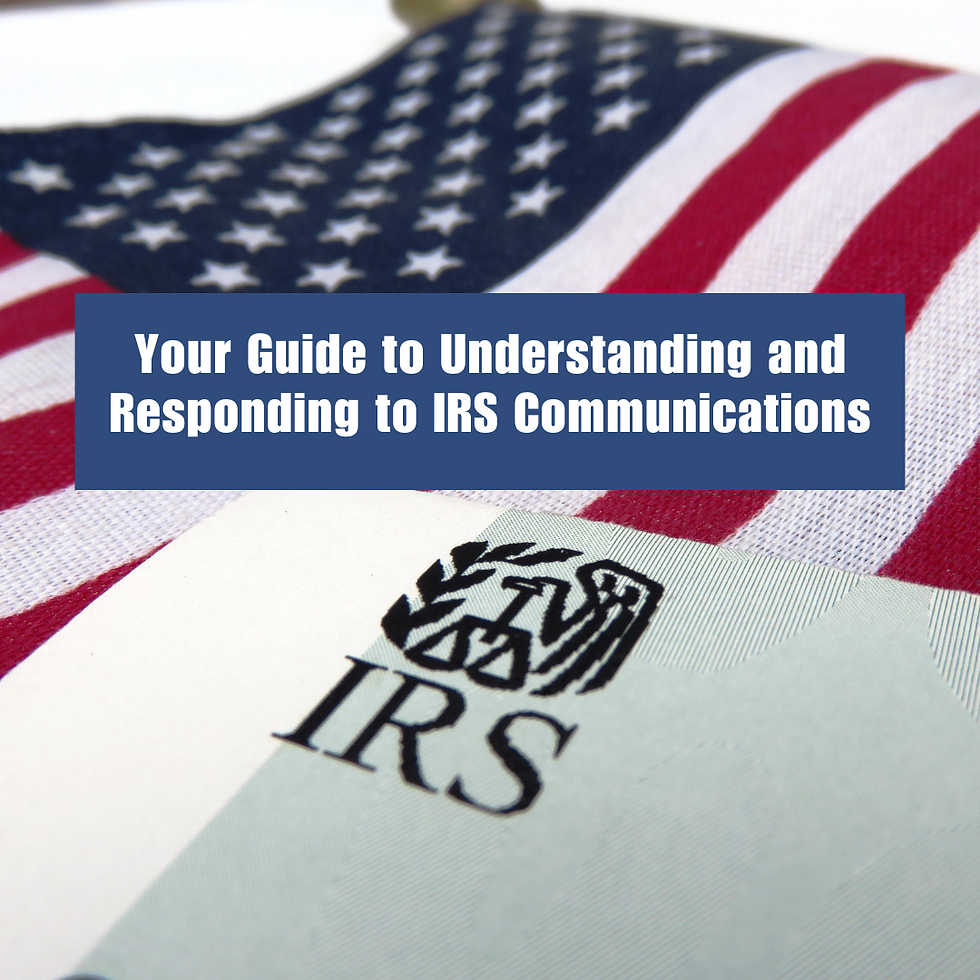Your Guide to Understanding and Responding to IRS Communications
- BookkeerperPro

- May 13, 2024
- 3 min read
Decode IRS Notices:

The Internal Revenue Service (IRS) issues a variety of notices and letters to taxpayers to address a wide range of tax issues. It is essential to understand these notices and take appropriate action to resolve any issues they may raise. In this blog, we'll explore the most common types of IRS notices, how to interpret them, and respond to them effectively.
Types of IRS Notices:
The IRS issues different types of notices to address various tax issues. Here are the most common warnings and their meaning:
CP2000 - Notification of Tax Return Discrepancies:
This notice is sent when the information reported on the taxpayer's tax return does not match the information the IRS has in its records.
Recommended Action: Review the notice carefully to identify any discrepancies and provide the necessary documentation to correct any errors.
CP11 - Change in the Filed Tax Return:
Indicates that the IRS has made a change to the tax return filed by the taxpayer.
Recommended Action : Review the change made by the IRS and make sure you understand the reasons behind this change. If you agree, there is no need to respond; Otherwise, follow the instructions provided to dispute the change.
CP504 - Notice of Collection of Back Taxes:
Advises about back taxes and collection actions that the IRS may take if the tax debt is not resolved.
Recommended Action: Take immediate steps to resolve the tax debt, either by paying the amount owed or establishing a payment plan with the IRS to avoid collection actions.
CP3219A - Audit Notification:
Notifies the taxpayer that the IRS has selected their tax return for an audit and requests additional documentation.
Recommended Action: Gather all requested documentation and cooperate fully with the IRS audit to resolve any identified tax issues.
How to Respond to IRS Notices:
Read the Notice Carefully: Review the notice carefully to understand the specific problem and required actions.
Identify the Problem: Determine the nature of the tax problem raised in the notice, such as tax return discrepancies, back taxes, or an audit.
Gather Documentation: If the notice requests additional information or supporting documentation, gather all relevant documents before responding.
Respond Within the Deadline: It is important to respond to the notice within the established deadline to avoid possible fines or penalties.
Follow Instructions: Follow the instructions provided in the notice to appropriately respond to the tax issue raised.
When to Seek Professional Help:
If you feel overwhelmed or confused by an IRS notice, consider seeking professional help. Here are some signs that it may be time to contact a tax professional:
If you do not fully understand the notice or the tax issue it raises.
If the notice involves an audit or significant discrepancies in the tax return.
If you need assistance collecting documentation or responding to the notice effectively.
BookkeeperPro : Your Partner in Tax Matters:
At BookkeeperPro , we have helped many taxpayers understand and respond to IRS notices effectively. Our team of certified tax accounting experts can provide you with the guidance and support needed to resolve any tax issue you may face. Don't hesitate to contact us if you need help with an IRS notice or any other tax matter. We're here to help you keep your finances in order and avoid problems with the IRS.




Comments